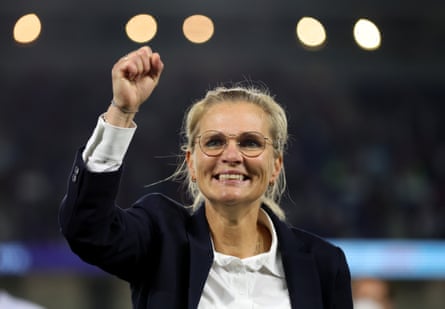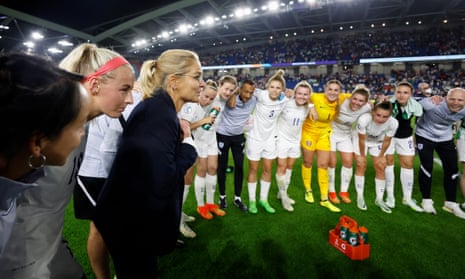For any of the 7.6 million BBC One viewers who tuned in to watch England’s dramatic extra-time defeat of Spain in the quarter-finals of the Euros on Wednesday night, the sight of an animated blond Dutch woman on the touchline will not have gone unnoticed.
Sarina Wiegman, England’s manager, is fast becoming a talking point. Less for her antics – although watching her being lifted aloft in a bear-hug from centre-back Millie Bright after the full-time whistle was a treat – and more for the 11-month transformation of the Lionesses from disjointed and confidence-drained to contenders on the biggest of stages.
During England’s 2-1 defeat of bookies’ favourites Spain, Wiegman was uncharacteristically dynamic, perhaps because she had been forced to watch the previous game from the squad’s training base in west London, after testing positive for Covid.
But it was her bravery, coupled with tactically astute management, that would help claw the Lionesses back into a game that looked to be heading beyond them. When they were losing one-nil, she substituted tournament top scorer Beth Mead, England record goalscorer Ellen White and the team’s creative wonder, Fran Kirby.

As a manager who always focuses on the process rather than the end result, Wiegman’s journey to being one of the best managers in the world has been a patient, dogged and considered process.
The 52-year-old flouted the rules to be able to play in a boys’ team when she was a child growing up in The Hague. The creative midfielder would go on to become one of the Netherlands’s most prolific players, becoming the first to reach 100 caps for the women’s national team.
At a tournament in China in 1991, she caught the eye of the US women’s national team head coach Anson Dorrance, who would recruit the Dutch player to come to study at the University of North Carolina and play for his women’s team there. During her time in the US, Wiegman would battle her way into a side that boasted US women’s national team stars such as Mia Hamm and Kristine Lilly but, more significantly, she left with a keen desire to see the type of environment she had experienced in the US replicated back home in the Netherlands.
She trained as a PE teacher while she continued to play and took a break from football to have two children. After retiring she became a coach, eventually quitting her teaching job to coach full-time.
She became the first woman to coach in the men’s professional game in the Netherlands when she took a temporary assistant’s job with Jong Sparta Rotterdam. In 2016, she took charge of the Netherlands women’s national team and guided the team to an unexpected and first Euros victory, at home, in 2017, before leading them to the 2019 Women’s World Cup final.
During that historic Euros win, which transformed attitudes towards women’s football in the Netherlands, Wiegman dropped the team’s captain, Mandy van den Berg, demonstrating that winning took precedence over sentimentality. That is the same ruthlessness she has shown with England, having removed the captaincy from Steph Houghton while she was out injured, before dropping the influential player from the squad before the tournament this summer. It was the same ruthlessness she showed on Wednesday night, when England needed to score to keep their Euros dream alive.
There is a clarity to the way the Lionesses have played since her arrival. Each squad member talks about the clarity of her messages and of an attention to detail. That focus on detail meant that when Wiegman was struck down with Covid before the game against Northern Ireland, there was already a plan in place for how things would operate.
At the centre of everything is the team, playing without pressure and with a love of the game. Wiegman tends to deflect journalists’ questions about individual performances in interviews, because she believes that no outstanding individual performance would happen without the support of the team.
And the desire for the players to have fun comes from a simple place. “As a player sometimes I didn’t think I enjoyed it enough,” Wiegman said in Switzerland before the Euros. “I worked so hard. You’re there, you’re doing what you love the most, you’re doing your best, so why don’t you just have fun, too?
“As I grew in my personality, I really wanted to be relaxed more. Why do players start playing football when they’re seven years old? It’s because they love the game. Yes, it’s all about winning, but you perform better when you can be yourself and when you’re in an environment – and it sounds like school – an environment where you’re safe, where you will not be judged. Because when you’re on the pitch you’re being judged all the time and that’s uncomfortable and unsafe.”
Wiegman’s side face Sweden in the semi-final on Tuesday. If they win, they have the chance of succeeding where the men’s team failed last summer – winning the Euros in front of 90,000 fans at Wembley.
